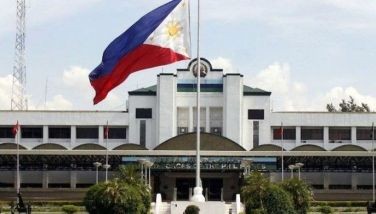Cellular phone firms willing to face House inquiry
February 14, 2005 | 12:00am
Officials of telecommunications companies Sun Cellular, Globe and Smart said yesterday they are willing to be investigated by the House of Representatives over Sun’s "24-7" unlimited call and text service for its subscribers and why its rivals could not give similar rates.
William Pamintuan, senior vice president of Digital Telecommunications Phils. Inc., lauded the move, saying it supports their stand that there is nothing wrong with competition.
"It is a welcome move to finally shed light on the subject," he said.
Pamintuan said he will attend House hearings to explain their side on the accusations of predatory pricing and questionable quality of service hurled against Sun by Globe and Smart.
Sun Cellular is the trade name of Digitel Mobile Philippines Inc., a unit of listed Digital Telecommunications Phils. Inc., owned by tycoon John Gokongwei.
Jones Campos, Globe’s vice president for communications, also said he will attend House hearings that will allow him to present the logic behind their allegations regarding Sun’s 24/7 service.
"We are willing to attend a congressional inquiry into this. Why not?" he said.
Smart vice president for corporate communications Ramon Isberto echoed Campos’ sentiments.
Industry sources said both Globe and Smart question Sun’s capability to support its "24/7" service. These insiders also said Isabela Rep. Rodolfo Albano’s privilege speech last Thursday lacked important details such as complaints filed against Sun, including connection problems ranging from dropped calls, a constantly busy network, and lack of signal.
The sources said cheaper service does not always mean better service.
"The truth about the service and the quality of service will come out. Let that hearing proceed. We will see who is trying to protect the consumer from whom," a source said.
Pamintuan accused Smart and Globe of using their subsidiaries to prevent Sun from attracting more subscribers.
"These two giants that are raking in billions in profits yearly are trying to prevent us from offering good value and better alternative to consumers instead of reviewing their own pricing mechanism and giving back some of their gains to subscribers," he said.
Pamintuan pointed out that in other countries such as the United States, a subscriber can make unlimited calls to other subscribers within the same network for a fee.
Globe and Smart, through their subsidiaries — Innove and Piltel, respectively — filed petitions with the National Telecommunications Commission asking the NTC to issue a cease-and-desist order against Sun’s "24/7" service, which offers unlimited calls and texting among Sun-to-Sun subscribers per month for an additional fee for pre-paid and post-paid subscribers.
In its complaint, Innove and Piltel claimed Sun had employed "predatory pricing" in its promotional gimmick, branding it as "an anti-competitive measure employed by a dominant company to get/protect market share from new or existing competitors."
Pamintuan, however, said predatory pricing can only be applied to dominant players. Sun Cellular, which has less than five percent of the market, cannot be considered as such, he said.
Globe ended 2004 with 12.5 million subscribers while Smart is expected to announce a customer base of more than 19 million for last year. Sun Cellular claimed it ended 2004 with more than 1.1 million clients.
The complainants wanted the NTC to set all call rates at P5.50 per minute and bar Sun Cellular from charging much lower rates. Globe and Smart currently charge roughly P4.50 per minute.
The service, originally offered as a promotional campaign by Sun, was made permanent following its success in luring thousands of new customers. The promo has been popular among college students and low-income consumers.
Pamintuan said Sun is expanding its network daily to meet the growing demand. The company now has more than 1,300 cellular sites as it approaches its second year of operations this March.
William Pamintuan, senior vice president of Digital Telecommunications Phils. Inc., lauded the move, saying it supports their stand that there is nothing wrong with competition.
"It is a welcome move to finally shed light on the subject," he said.
Pamintuan said he will attend House hearings to explain their side on the accusations of predatory pricing and questionable quality of service hurled against Sun by Globe and Smart.
Sun Cellular is the trade name of Digitel Mobile Philippines Inc., a unit of listed Digital Telecommunications Phils. Inc., owned by tycoon John Gokongwei.
Jones Campos, Globe’s vice president for communications, also said he will attend House hearings that will allow him to present the logic behind their allegations regarding Sun’s 24/7 service.
"We are willing to attend a congressional inquiry into this. Why not?" he said.
Smart vice president for corporate communications Ramon Isberto echoed Campos’ sentiments.
Industry sources said both Globe and Smart question Sun’s capability to support its "24/7" service. These insiders also said Isabela Rep. Rodolfo Albano’s privilege speech last Thursday lacked important details such as complaints filed against Sun, including connection problems ranging from dropped calls, a constantly busy network, and lack of signal.
The sources said cheaper service does not always mean better service.
"The truth about the service and the quality of service will come out. Let that hearing proceed. We will see who is trying to protect the consumer from whom," a source said.
Pamintuan accused Smart and Globe of using their subsidiaries to prevent Sun from attracting more subscribers.
"These two giants that are raking in billions in profits yearly are trying to prevent us from offering good value and better alternative to consumers instead of reviewing their own pricing mechanism and giving back some of their gains to subscribers," he said.
Pamintuan pointed out that in other countries such as the United States, a subscriber can make unlimited calls to other subscribers within the same network for a fee.
Globe and Smart, through their subsidiaries — Innove and Piltel, respectively — filed petitions with the National Telecommunications Commission asking the NTC to issue a cease-and-desist order against Sun’s "24/7" service, which offers unlimited calls and texting among Sun-to-Sun subscribers per month for an additional fee for pre-paid and post-paid subscribers.
In its complaint, Innove and Piltel claimed Sun had employed "predatory pricing" in its promotional gimmick, branding it as "an anti-competitive measure employed by a dominant company to get/protect market share from new or existing competitors."
Pamintuan, however, said predatory pricing can only be applied to dominant players. Sun Cellular, which has less than five percent of the market, cannot be considered as such, he said.
Globe ended 2004 with 12.5 million subscribers while Smart is expected to announce a customer base of more than 19 million for last year. Sun Cellular claimed it ended 2004 with more than 1.1 million clients.
The complainants wanted the NTC to set all call rates at P5.50 per minute and bar Sun Cellular from charging much lower rates. Globe and Smart currently charge roughly P4.50 per minute.
The service, originally offered as a promotional campaign by Sun, was made permanent following its success in luring thousands of new customers. The promo has been popular among college students and low-income consumers.
Pamintuan said Sun is expanding its network daily to meet the growing demand. The company now has more than 1,300 cellular sites as it approaches its second year of operations this March.
BrandSpace Articles
<
>
- Latest
- Trending
Trending
Latest
Trending
Latest
Recommended






























